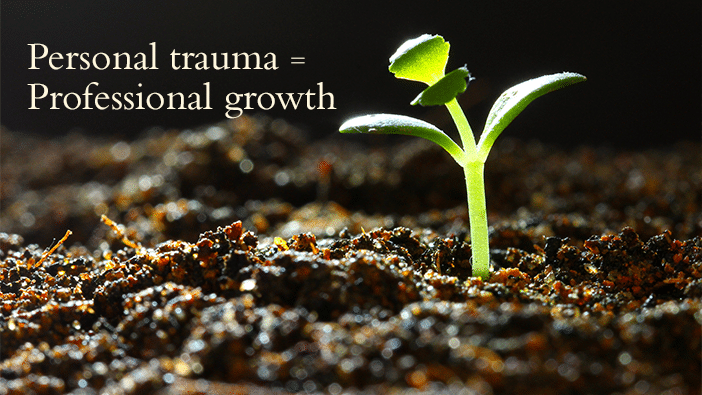Written by Dr Amy Armstrong, faculty member at Ashridge Executive Education at Hult. This blog is based on Dr Armstrong’s PhD thesis (2014) ‘I’m a better manager: A biographic narrative study of the impact of personal trauma on the professional lives of managers in the UK’, Aston University.
When asked about their most powerful learning experiences to date, managers often cite experiences outside of the work environment. It is personal hardships that are quoted, such as family breakdown, illness, or the death of a loved one, yet more often than not, these experiences remain hidden from work. This is because in many work contexts people fruitlessly strive to keep their personal lives separate. As one HR Director recently said to me “if anyone in my team knows I’m having a bad day, then I’ve failed”.
The prevailing culture in many organizations is one where people are expected to put on a brave face, so their true feelings are not shown and their personal struggles are not shared. As a consequence, the powerful learning that is present in experiences of hardship remains unsurfaced. I spent six years immersed in a study on this topic and found that despite intense suffering, managers who had experienced personal hardship, such as illness or bereavement, described their traumas as instrumental to their professional development.
My study explored a concept which has emerged from the field of positive psychology called post-traumatic growth (Calhoun & Tedeschi, 2006; Tedeschi & Calhoun, 1996; 2004), which is the idea that despite acute distress, many individuals report positive psychological changes following trauma.
Individuals can experience growth in different ways. Some talk of increased personal strength, that is to say they believe they are emotionally and psychologically stronger than before their trauma. Others talk about discovering a new life path or a new philosophy on life that was not present before. Some people describe positive changes in their relationships as a result of their trauma, such as increased openness and self-disclosure and a greater emotional connection with others. Others talk of changing life priorities and a greater appreciation of the small things in life. Finally, previous research on post-traumatic growth has found some individuals report increased spirituality or finding faith as a result of their trauma.
One of the problems with previous research is that it was focused on post-traumatic growth among professionals working in ‘extreme’ settings, such as disaster recovery work, the military and the emergency services. These settings are atypical and therefore it is difficult to draw learning in support of management and leadership development. However, my study was the first study of its kind to look at growth through trauma among managers working in ‘everyday’ work environments and the results were fascinating.
The managers involved described their traumas as their catalyst for growth. ‘Managerial growth’ emerged during their descriptions of the positive changes that occurred in the way that they managed others as a result of their trauma. For example, some managers talked about their trauma as helping them learn to ‘let go’ and to trust and empower their direct reports. Others talked about leading with increased emotional intelligence and compassion. Some talked about being more open and honest with their team by sharing their true feelings at work, which they believed helped to build trust and counter-disclosure.
These findings connect directly to the concept of authentic leadership (Avolio, Griffith, Wernsing, & Walumbwa, 2010) whereby leaders are encouraged to learn from ‘trigger events’ such as personal trauma. My research argues that if we can create ‘safe’ situations in which leaders and managers can talk about personal hardship, these ‘trigger’ experiences are critical moments of learning and can help the leader to understand themselves and their own strengths; their behaviours under pressure and their coping mechanisms. If we give leaders and managers the time and space to self-reflect with the support of others, the culmination of this is heightened self-awareness, which we all know lies at the heart of effective and authentic leadership.
To learn about Hult’s Global One-Year MBA, download a brochure.
Listen to Dr Amy Armstrong’s webinar to learn more about her research into this fascinating topic.
References:
Avolio, B.J., Griffith, J, Wernsing, T.S., & Walumbwa, F.O. (2010) What is authentic leadership development? In A. P. Linley, Harrington, S., & Garcea, N., (Ed.), Oxford Handbook of Positive Psychology and Work (pp. 289-297): Oxford University Press.
Calhoun, L.G., and Tedeschi, R.G. Ed. (2006). The Handbook of Posttraumatic Growth: Research and Practice, Lawrence Erlbaum Associates.
Tedeschi, R.G., and Calhoun, L.G. (1996). The Posttraumatic Growth Inventory: Measuring the Positive Legacy of Trauma. Journal of Traumatic Stress, 9(3), 455-471.
Tedeschi, R.G., and Calhoun, L.G. (2004). Posttraumatic Growth: Conceptual Foundations and Empirical Evidence. Psychological Inquiry, 15(1), 1-18.


Amy Armstrong
BA (Hons), MBA, PhD
Is a faculty member in Ashridge Qualifications for Ashridge Executive Education at Hult. Her research and teaching interests sit in the field of organisational behaviour and include engagement, well-being, resilience, toxicity, compassion and emotions at work. Amy is Academic Director on a new Masters in Leadership program that is due to launch in 2017 and is also curating the leadership module on Executive MBA for the Creative Industries.
Amy recently returned to Ashridge from the University of Bedfordshire where she was a Senior Lecturer in Organisational Behaviour. She was previously an Ashridge a faculty member for ten years, engaging in research, working with a variety of corporate clients, and leading graduate programmes.
Amy is a Visiting Fellow at Aston University. She also leads research into barriers to engagement for Engage for Success, a Government-led movement which is seeking to improve engagement and well-being levels across the U.K.
See Amy Armstrong’s full bio and publications list.
Step up your game with executive education at Ashridge agile business school. To find out more, take a look at our blog Career mapping: How to become an executive in the next 5 years, or firm up your exec career footing with a Masters in International Business from Hult. Download a brochure or get in touch today to find out how Hult can help you learn everything about the business world, the future, and yourself.


